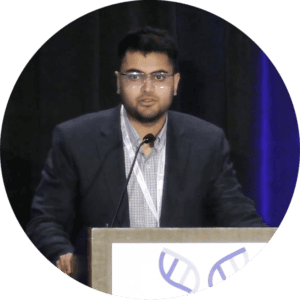Good morning, everyone. My name is Arjun Pillai and I would like to talk about my own personal journey with SCN1A.
I carry a change in my SCN1A gene, which is the cause of my epilepsy. My brother, Siddharth, carries the same change, but my epilepsy has been much milder over the years. And I would like to talk to you as this helped me develop a unique perspective of our conditions and a deep interest in healthcare.
I was diagnosed with epilepsy by Dr. Peter Berman, who at the time was the head of child neurology at CHOP. Dr. Berman helped provide us with a few clever strategies for our genetic condition. Good sleep hygiene, sufficient hydration, and methods to keep our body temperature cool.
State of Science
In March of 2024, Stoke Therapeutics, Inc. announced landmark new data that supports the potential for STK-001, a proprietary antisense oligonucleotide (ASO), to be the first disease-modifying medicine for the treatment of patients with Dravet syndrome.
“For decades, the primary goal of treating Dravet syndrome has been to control the frequency and severity of seizures, but, as we can now see from natural history data, many patients still experience high rates of seizure frequency and fall further and further behind in their neurodevelopment…A 50% reduction in seizures is an important measure of clinical efficacy, so an 80% reduction on top of any benefit patients may already be getting from their baseline anti-seizure regimen is profound. The further evidence of improvements in skills like communication, behavior, socialization and movement distinguish this approach from anything we have seen to date and mark our entry into a new era in the treatment of Dravet syndrome.”
– Dr. Joseph Sullivan, M.D., FAES, Professor of Neurology and Pediatrics and Director of the Pediatric Epilepsy Center of Excellence at the University of California San Francisco
My own struggle with accepting my epilepsy diagnosis started in elementary school. I had lots of difficulties and I started to realize that everyone else around us did not struggle as much as we did. This was frustrating, and honestly, isolating.
In high school, things became clear when we finally received our SCN1A diagnosis. Yes, I do know my g dot (g.), c dot (c.), p dot (p.), thank you Dr. Helbig. Siddharth and I carry a pathogenic P 2 81 L, that’s P 2 81 L variant. This information really helped me understand and accept my epilepsy.
Then after graduating in 2020, I started undergrad at Temple, first in neuroscience, and then I switched to psychology because of my interest in the field. I also started volunteering in a mental health facility near my college. Then I discovered the summer student program at ENGIN, CHOP’s epilepsy genetics team. I applied and was accepted. I was excited to actually work in the program that found my brothers and my mutation.
I ended my first junior year semester successfully, excelling both academically and socially. I don’t mean to brag, but this really boosted my self-esteem and confidence. This allowed me to spend more time with my family and dive more deeply into research.

Before DSF: Patient families had no treatment options specifically for Dravet syndrome and a limited understanding of genetic conditions like SCN1A mutations.
With DSF: With the foundation accelerating research, Arjun and others in the Dravet community have a greater understanding of this disease.
Hope for the Future: Neurologists and researchers believe we’re at the forefront of bringing much better treatments and disease-modifying therapies to patients with genetic epilepsies.
My brother Siddharth has typical Dravet syndrome. Even though we have the same mutation, his seizures have always been more frequent and difficult to treat and started much earlier. And I’m here to help my team recruit for the Dravet Genome Project, and we hope that we can understand why this is the case.
This is my personal journey with SCN1A and beyond. I’m deeply influenced by the experiences with my brother and how the providers who help were my role models. And what I learned was that I would really like to advocate for those in need, and I hope that I can meaningfully contribute to healthcare in the future myself.
Thank you for allowing me to share my story. This is my first time at the DSF conference. I’m very, very humbled by the community that you have built. Thank you once again.
Original story shared by Arjun at the 2024 DSF Biennial Family & Professional Conference.

